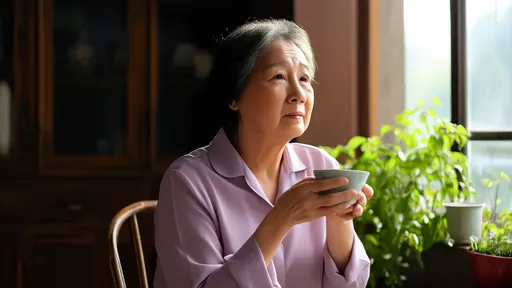Menopause is a natural biological process that marks the end of a woman's reproductive years. It typically occurs in the late 40s or early 50s, though the exact timing varies from person to person. This transition is often accompanied by a range of physical and emotional symptoms, which can significantly impact daily life. While menopause is a universal experience for women, the way it manifests and is managed differs widely across cultures and individuals.
The term menopause refers specifically to the point in time when a woman has not had a menstrual period for 12 consecutive months. However, the journey to this stage, known as perimenopause, can last several years. During perimenopause, hormone levels—particularly estrogen and progesterone—begin to fluctuate, leading to irregular periods and various symptoms. Some women navigate this phase with minimal discomfort, while others face challenges that require medical or lifestyle interventions.
One of the most commonly discussed aspects of menopause is the array of symptoms that accompany it. Hot flashes, night sweats, and sleep disturbances are frequently reported. These symptoms arise due to the body's adjustment to declining estrogen levels. Hot flashes, in particular, can be unpredictable, causing sudden waves of heat, flushing, and sweating. For some women, these episodes are mild and infrequent, but for others, they can be severe enough to disrupt work, social activities, and overall quality of life.
Beyond the physical symptoms, menopause can also affect emotional and mental well-being. Mood swings, irritability, and increased anxiety are not uncommon. Some women report feelings of sadness or loss, particularly if they associate menopause with aging or the end of fertility. Cognitive changes, such as difficulty concentrating or memory lapses—sometimes referred to as "brain fog"—can also occur. These emotional and mental shifts are often intertwined with the physical changes, creating a complex experience that requires a holistic approach to management.
Bone health is another critical consideration during menopause. Estrogen plays a vital role in maintaining bone density, and its decline can lead to an increased risk of osteoporosis. This condition weakens bones, making them more susceptible to fractures. Women are encouraged to prioritize calcium and vitamin D intake, engage in weight-bearing exercises, and discuss bone density screenings with their healthcare providers. Early intervention can help mitigate the long-term effects of bone loss.
Heart health is similarly impacted by hormonal changes. Estrogen has a protective effect on the cardiovascular system, and its reduction can contribute to higher risks of heart disease. Blood pressure and cholesterol levels may shift during menopause, necessitating closer monitoring. Lifestyle choices, such as maintaining a balanced diet, exercising regularly, and avoiding smoking, become even more important during this stage of life.
While menopause is often framed as a challenging transition, it’s important to recognize that it can also be a time of empowerment and renewal. Many women find that postmenopausal life offers new opportunities for personal growth, freedom from menstrual-related concerns, and a chance to focus on self-care. The narrative around menopause is gradually shifting, with more open conversations and resources available to support women through this natural phase.
Treatment options for managing menopause symptoms are diverse and should be tailored to individual needs. Hormone replacement therapy (HRT) is one of the most effective methods for alleviating hot flashes and preventing bone loss, though it’s not suitable for everyone. Non-hormonal medications, such as certain antidepressants, can also provide relief for some symptoms. Additionally, many women turn to complementary therapies, including acupuncture, herbal supplements, and mindfulness practices, to enhance their well-being.
Lifestyle adjustments can make a significant difference in navigating menopause. Regular physical activity, such as yoga or walking, can help manage weight, improve mood, and support bone and heart health. A diet rich in fruits, vegetables, whole grains, and lean proteins can provide the nutrients needed to sustain energy levels and overall health. Prioritizing sleep hygiene—such as maintaining a cool bedroom environment to combat night sweats—can also improve rest quality.
Social support plays a crucial role in how women experience menopause. Open dialogue with friends, family, or support groups can reduce feelings of isolation and provide practical advice. Healthcare providers should be approached as partners in this journey, offering guidance and personalized care plans. The more women feel heard and understood, the better they can advocate for their needs during this transition.
Cultural attitudes toward menopause vary widely, influencing how women perceive and cope with this life stage. In some societies, menopause is celebrated as a rite of passage, while in others, it remains a taboo subject. Increasing awareness and education can help dismantle stigma and foster more inclusive conversations about women’s health at every age.
Ultimately, menopause is a unique and individual experience. There is no one-size-fits-all approach, and what works for one woman may not work for another. The key is to stay informed, seek support, and make choices that align with personal health goals and values. With the right resources and mindset, menopause can be navigated with confidence and grace.

By /Aug 15, 2025

By /Aug 15, 2025

By /Aug 15, 2025

By /Aug 15, 2025

By /Aug 15, 2025

By /Aug 15, 2025

By /Aug 15, 2025

By /Aug 15, 2025

By /Aug 15, 2025

By /Aug 15, 2025

By /Aug 15, 2025

By /Aug 15, 2025

By /Aug 15, 2025

By /Aug 15, 2025

By /Aug 15, 2025

By /Aug 15, 2025

By /Aug 15, 2025

By /Aug 15, 2025

By /Aug 15, 2025

By /Aug 15, 2025